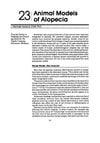 70 citations,
January 2000 in “Hormone Research in Paediatrics”
70 citations,
January 2000 in “Hormone Research in Paediatrics” SAHA syndrome is a condition in women involving skin and hair issues, often related to hormonal imbalances, and is treated based on the underlying cause.
 92 citations,
December 2016 in “Scientific Reports”
92 citations,
December 2016 in “Scientific Reports” Researchers identified genes linked to coat color, body size, cashmere production, and high altitude adaptation in goats.
 4 citations,
August 2017 in “Journal of Cosmetic Dermatology”
4 citations,
August 2017 in “Journal of Cosmetic Dermatology” Finger length ratio may indicate male hair loss.
 36 citations,
September 2015 in “Forensic Science International: Genetics”
36 citations,
September 2015 in “Forensic Science International: Genetics” Certain DNA variants can predict straight hair in Europeans but are not highly specific.
 6 citations,
May 2006 in “Skinmed”
6 citations,
May 2006 in “Skinmed” Androgens contribute to common male hair loss; more research needed for hair growth medication.
55 citations,
August 2013 in “PloS one” Genetic differences between young and old Tan sheep explain why their fleece changes from curly to straight as they age.
 21 citations,
October 2019 in “The journal of investigative dermatology/Journal of investigative dermatology”
21 citations,
October 2019 in “The journal of investigative dermatology/Journal of investigative dermatology” A specific gene change plus an additional mutation in the same gene cause hereditary trichilemmal cysts.

Higher levels of β-carotene and vitamin E may help prevent certain types of hair loss.

The chapter explains that there are many genetic skin disorders affecting skin cell formation, including both common and rare types.
 January 2023 in “Czech Journal of Animal Science”
January 2023 in “Czech Journal of Animal Science” Proteins influence the quality and traits of cashmere goat fleece, affecting hair strength and diameter.
 5 citations,
January 1998 in “Clinical and experimental dermatology”
5 citations,
January 1998 in “Clinical and experimental dermatology” Myotonic dystrophy should be considered in patients with hair thinning, and genetic counseling is important.
 11 citations,
August 1997 in “Expert Opinion on Therapeutic Patents”
11 citations,
August 1997 in “Expert Opinion on Therapeutic Patents” Many potential alopecia treatments need more testing to confirm they promote acceptable hair growth with minimal side effects.
 13 citations,
June 1989 in “Pediatric clinics of North America/The Pediatric clinics of North America”
13 citations,
June 1989 in “Pediatric clinics of North America/The Pediatric clinics of North America” The conclusion is that young women with excessive hair growth should be quickly tested for hormonal issues and treated to improve their social well-being.
 30 citations,
January 2000 in “Dermatologic Clinics”
30 citations,
January 2000 in “Dermatologic Clinics” Finasteride and minoxidil are effective FDA-approved treatments for androgenetic alopecia.
18 citations,
January 2013 in “PLoS ONE” HLA-DRB5 and other genes may be linked to alopecia universalis.
 4 citations,
October 2014 in “Springer eBooks”
4 citations,
October 2014 in “Springer eBooks” Ethylene and auxin hormones interact in complex ways that are essential for plant growth and development.
 54 citations,
July 2002 in “Clinical and Experimental Dermatology”
54 citations,
July 2002 in “Clinical and Experimental Dermatology” DHT, a testosterone byproduct, causes male pattern baldness.
 356 citations,
March 2012 in “Trends in Plant Science”
356 citations,
March 2012 in “Trends in Plant Science” Auxin and ethylene hormones both work together and against each other to control plant growth.

TBX3 gene affects horse coat color, with higher expression in darker areas.
 8 citations,
October 1988 in “Clinics in dermatology”
8 citations,
October 1988 in “Clinics in dermatology” The best animal model for studying male-pattern baldness is the stumptailed macaque, not rats or mice.
 22 citations,
August 2006 in “Critical Reviews in Plant Sciences”
22 citations,
August 2006 in “Critical Reviews in Plant Sciences” The tropical legume Sesbania rostrata can form nodules in waterlogged conditions using a different method that involves plant hormones and specific genes.
 68 citations,
September 2003 in “British Journal of Dermatology”
68 citations,
September 2003 in “British Journal of Dermatology” Shrinking skin cancer increases the chance of cancer in nearby lymph nodes.
 16 citations,
January 2007 in “Journal of Obstetrics and Gynaecology”
16 citations,
January 2007 in “Journal of Obstetrics and Gynaecology” The document suggests various treatments for PCOS, including medication for menstrual issues, insulin resistance, and excess hair, as well as fertility treatments, while highlighting the need for personalized care and lifestyle changes.
 January 2023 in “Pesquisa Veterinária Brasileira”
January 2023 in “Pesquisa Veterinária Brasileira” A KRT71 mutation in Hereford cattle in Uruguay causes thin, curly hair and scaly skin.
 2 citations,
August 2020 in “Scientific reports”
2 citations,
August 2020 in “Scientific reports” Genes related to keratin, skin cell differentiation, and immune functions are key in hedgehog skin and spine development.
 March 2024 in “Cytologia”
March 2024 in “Cytologia” LncRNA MTC boosts growth of goat skin cells, improving cashmere quality.
 1 citations,
July 2023 in “Horticulture research”
1 citations,
July 2023 in “Horticulture research” Tiny RNA molecules help control the growth of plant hairs.
 29 citations,
July 2004 in “Pharmacology, Biochemistry and Behavior”
29 citations,
July 2004 in “Pharmacology, Biochemistry and Behavior” Finasteride reduces alcohol withdrawal effects, especially in female mice.
 42 citations,
January 2017 in “Genes”
42 citations,
January 2017 in “Genes” The gene KAP22-1 affects wool yield and fiber shape in sheep.
 26 citations,
March 2014 in “Arquivos Brasileiros De Endocrinologia E Metabologia”
26 citations,
March 2014 in “Arquivos Brasileiros De Endocrinologia E Metabologia” The document concludes that proper diagnosis and combined treatments are key for hirsutism management, and weight loss may help overweight patients.




























